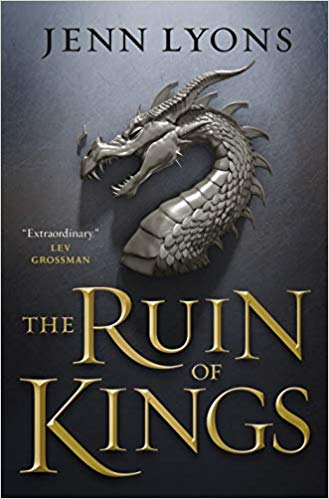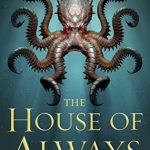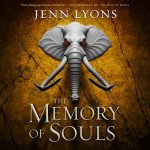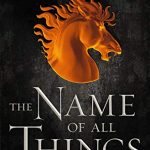 The Ruin of Kings (A Chorus of Dragons, #1) by Jenn Lyons
The Ruin of Kings (A Chorus of Dragons, #1) by Jenn Lyons Format: audiobook, eARC, hardcover
Source: publisher, purchased from Audible, supplied by publisher via Edelweiss
Formats available: hardcover, paperback, ebook, audiobook
Genres: epic fantasy, fantasy
Series: Chorus of Dragons #1
Pages: 560
Published by Tor Books on February 5, 2019
Purchasing Info: Author's Website, Publisher's Website, Amazon, Barnes & Noble, Kobo, Bookshop.org
Goodreads
There are the old stories. And then there’s what actually happens.
Kihrin is a bastard orphan who grew up on storybook tales of long-lost princes and grand quests. When he is claimed against his will as the long-lost son of a treasonous prince, Kihrin finds that being a long-lost prince isn't what the storybooks promised.
Far from living the dream, Kihrin finds himself practically a prisoner, at the mercy of his new family's power plays and ambitions. He also discovers that the storybooks have lied about a lot of other things things, too: dragons, demons, gods, prophecies, true love, and how the hero always wins.
Then again, maybe he’s not the hero, for Kihrin isn’t destined to save the empire.
He’s destined to destroy it . . .
Uniting the worldbuilding of a Brandon Sanderson with the storytelling verve of a Patrick Rothfuss, debut author Jenn Lyons delivers an entirely new and captivating fantasy epic. Prepare to meet the genre’s next star.
My Review:
The “Ruin of Kings” is a sword. It’s also one hell of a story. Come to think of it, it’s also one hell of a sword.
That this is the author’s debut novel is amazing. Because this may very well be the epic fantasy of the year. It’s almost certainly the debut epic fantasy of the year. And I’m already positive that it will be on my Hugo ballot next year.
I’m going to try to stop squeeing now so that I can possibly talk about the actual book – and not just how much I loved it. Although I certainly did.
This story, like The Raven Tower earlier this year, is an experiment in voice. Unlike that previous book, however, this one works. It really, really works.
The three voices that tell the story of The Ruin of Kings are all fascinating, all compelling, and all utterly different. They are also telling the same story from not merely different perspectives but from different points in time. And yet, they all manage to meet in the end to set up the truly epic conclusion.
This is Kihrin’s story. And it’s Talon’s story. And it’s Thurvishar’s story. But mostly it’s Kihrin’s story, told partially from his perspective and partially from theirs. Well, sort of from theirs.
Talon is a mimic. A sadistic mimic. She’s a monster in the human sense of her sadism, but also in the sense that she really is a monster. She kills people for fun, eats their brains and receives the memories from the brains she eats. So when she tells the story, it’s partially her perspective and partially the perspective of the people whose brains she ate.
Thurvishar is the peanut gallery. Not really, in the end his perspective is more important than that. We begin the story thinking he’s the chronicler of events that have recently past – and he certainly is that. But he was also a part of those events, as well as being a scholar and researcher. He has opinions. He has quibbles. He gets disgusted with the naivete and the misinformation provided both by and to the other two people in the story.
It is a true story, but it’s told from a certain perspective. Eyewitness accounts are far from reliable, and people believe all sorts of things that are not provably true – or even that are provably false.
Especially when it comes to gods, and goddesses, and origin stories thereof.
This also, unusually for epic fantasy, is not a story about a hero saving the world. All the prophecies are pointing to Kihrin being the hero who will destroy the world. The question of whether (not to mention exactly how) he’s supposed to do this, as well as whether or not its a good idea for him to do this, are all still up in the super-heated air when this first book in the project trilogy closes.
Not even death is an ending in this one. It may only be the beginning. And what a marvelous beginning it is.
Escape Rating A+: Was that rating a surprise? Really? This is pure awesomesauce from beginning to end.
The story begins with Kihrin in jail, being coerced by Talon to tell her his story from his point of view while they wait for him to be sacrificed. He opens his own story at a slave auction, with himself as the slave being auctioned. And the pace never lets up from there.
But Talon is unsatisfied. As she so often is by so many things. She believes his story began earlier. When he broke into an empty house to steal whatever wasn’t nailed down and let his curiosity get the better of him. He witnessed a murder. And a demon summoning. And he got caught – by the demon. And eventually by both of the summoners.
It all leads back to that jail cell. And what comes after. But in the middle – it’s one hell of a story.
No one in this story is exactly what they seem – or even what they think they are. Particularly Kihrin, who begins the story as a thief and a minstrel’s son, and reaches the end as a swordsman, a sorcerer, and a prince. None of which turn out to be exactly what they’re cracked up to be.
In some ways, this story reminded me of Dune. I know that sounds odd, but it’s in the way the story is being told. Dune also begins with a chronicler claiming to be writing an unbiased historical account. An account that is not exactly unbiased – although I remember Princess Irulan trying a bit harder than Thurvishar does.
In other ways, it reminds me very much of The Name of the Wind. It has that same kind of depth, that epic scope and sweep, that same sense that nothing is as it seems. It’s also told somewhat the same way, with the character, or in this case the characters, telling the story to someone else. I just hope that the author of The Ruin of Kings manages to wrap up the trilogy a bit more expeditiously!
The voices of the three “narrators” of The Ruin of Kings are very distinct. Kihrin begins the story as young and naive, no matter how jaded he thinks he was. His naivete is under constant assault, and this is the story of his loss of many different types of innocence.
Talon has absorbed many, many people, and they are all distinct to her in her extremely crowded head. She speaks for them, but also for herself. Her perspective is that of someone who has literally seen everything and done everything – and then killed the people who did it.
Thurvishar begins the story speaking directly only within footnotes. It was Thurvishar’s part of the story that made me switch from the ebook to the audiobook. Footnotes do not work well in ebooks, but in audio his contributions were inserted as wry asides, or occasionally arguments, within the text and provided further information, sarcastic commentary, and light relief in turns.
(I actually have the audiobook and the eARC AND the hardcover. I loved this one real hard. I needed the hardcover for the maps.)
I was enjoying the audio so much than when I couldn’t stand not knowing how the story ended I played Solitaire for four hours so I’d have something to do with my hands while these three marvelous actors told me a terrific story.
The Ruin of Kings has everything a reader could possibly want in an epic fantasy. Unreliable narrators, meddling gods, troublesome demons, crazy dragons, evil necromancers and political shenanigans played to the death – all folded into the story of a lifetime.
Or two or three lifetimes. Death, after all, is not permanent. Except when it is.
The second book in the trilogy, The Name of All Things, is scheduled to be released in October. I want it NOW!
Reviewer’s Note: Goodreads claims that this is YA. It is so, so, so not YA. And it should come with all the trigger warnings, including some that probably don’t exist yet.



















